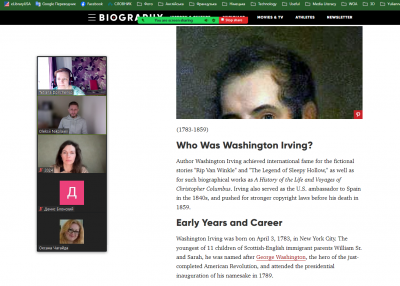Anne Newport Royall
Anne Newport Royall
1769-1854
Pioneer Woman Journalist
We all advocate the liberty of them, the liberty of speech, and the liberty of conscience.
—Anne Newport Royall
If Anne Royall had lived in the twentieth century, she would have been considered remarkable. In the early nineteenth century, she was truly extraordinary. At a time when few women worked outside the home and fewer women traveled on their own, this lady trekked up, down, and across the country gathering material for her writing. Then, at the age of si^tty-two, she began her own newspaper.
Anne was born near Baltimore, Maryland, but spent her early years m Pennsylvania. Her childhood was filled with traumatic events. Not only did her father and, later, her stepfather die, but the family's home was wiped out in an Indian attack. When she was about seventeen, Anne and her mother walked across the Allegheny Mountains. They settled in a small town in what is now West Virginia, where her mother found work as a household servant for William Royall, a wealthy Revolutionary War hero.
Because Anne was fascinated with his large library, William Royall became her tutor. Anne and William married when she was twenty-eight and William was close to fifty. Sixteen years later William Royall died. He left most of his estate to Anne, but his niece contested the will, accusing Anne of treating him "barbarously" during his last years and of forging his will. For the next ten years, Ann lived in Alabama while she fought the case in court. The case was finally settled in favor of the niece, leaving Anne, by then close to fifty-five years old, with nothing. She moved to Washington, D.C., and applied for a pension as the -widow of a Revolutionary War veteran, but again, her efforts resulted in years of court negotiations.
This was when Anne Royall began her writing career. Traveling by stagecoach, she wandered from New Orleans to Canada interviewing people and gathering material for the ten books she would "write. She earned her way as she went, placing ads in newspapers for one book while compiling notes for the next. Along the way, she met many newspaper editors and gained a reputation as a writer unafraid to voice strong opinions on almost any topic. One of her favorite targets was evangelical Presbyterians, because she felt they were overly vigorous in their efforts to convert people to their faith.
Between trips, Anne returned to Washington and became a familiar, if mostly unwelcome, figure in the halls of Congress as she tried to win her widow's pension. She eventually succeeded, but not until she was almost eighty, and then it was not much of a victory. Her husband's family claimed half the pension, and by the time she paid her legal fees and debts, she ended up with ten dollars.
In 1829, while she was in Washington, certain members of a Washington Presbyterian church, upset over her writing, decided to teach Anne a lesson. They sent a group of young boys to smash the windows of her house. Then the men stood under the broken windows praying loudly for her soul. Understandably, Anne, a woman known for her venomous temper, "was not too pleased with this kind of harassment. She screamed down at the men, calling one of them an "old bald-headed son of a b—h." For this, Anne was arrested and charged with being "an evil-disposed person, slanderer, and disturber of the peace," and with "being a common scold."
The trial became a media frenzy with Anne's friends standing up for her and her enemies calling for the proper punishment for the crime — being ducked in the river. The Secretary of State appeared as a witness on her behalf, as did many of her newspaper friends who supported her right to write freely.
After the trial, she gave up traveling, purchased an old printing press, set it up in her kitchen, and began her first newspaper, the "Paul Pry", in which she vowed to expose political evil and religious fraud. The paper featured Anne's opinions on controversial topics and the latest gossip about Washington figures. Fulfilling her promise, she -wrote stories about such things as a minor official who used a public wagon and horses to go to the theater and how the city of Washington was contributing to cholera epidemics by refusing to either improve the city's sewage system or drain a swamp that was a breeding ground for disease. But while she was quick to condemn what she saw as evil, she was just as quick to praise what she felt was good.
Dressed in her shabby clothes (the only ones she owned), she took her papers to Capitol Hill and peddled them in the halls of Congress. Those who didn't buy one often found themselves the subject of a barbed article the following week.
"PauLPry" was published for five years, but never earned Anne more than a pittance. Once President Andrew Jackson met her on her way home from the market, and seeing only a scrawny chicken in her basket, invited her to the White House for a decent meal.
Hoping to change her paper's image as nothing more than a gossip sheet, she renamed it "The Huntress". In the first issue of the new paper, she promised to continue her pursuit of corruption, but said she would also offer literary pieces, essays, and other features. She wrote less gossip, but continued to proclaim her opinions on current affairs, speaking out for justice for American Indians, freedom of speech and the press, and free public education.
She had opinions on everything. She thought Samuel Morse's telegraph invention was wonderful, she hated slavery, but she did not approve of the tactics of abolitionists. She ridiculed Amelia Bloomer's trousers for women, and though she stood up for women's rights, she was not in favor of women's suffrage. Her campaign against overeager ministers remained vigorous, but she urged greater tolerance toward Roman Catholics and other groups. Some editors praised her for her "fearlessness of spirit," and others accused her of writing nothing but "scum and political filth."
For the fourteen years she published "The Huntress", her paper was printed in her kitchen on a second-hand press with type that had been discarded by other printers. Because her house was often unheated in the winter, she had problems with frozen ink and paper. In the last issue of "The Huntress', printed a few months before her death, she wrote that she had only thirty-one cents to her name and would, for the first time ever, be unable to pay her rent of six dollars. Sixty years after her burial in a pauper's grave in the Congressional Cemetery- a marker reading, "Anne Royall, Pioneer Woman Publicist," was placed at the site.
This information is only for education purpose, and was taken from ' Extraordinary Women Journalists' by Claire Price-Groff.- Children's Press, USA










